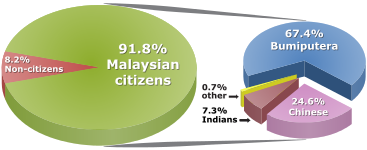- Reaction score
- 4,292
- Points
- 1,160
pbi said:I think, based on what I have seen, and from speaking with others who have spent time in various Gulf states, that this is a serious problem and probably a vulnerability. IMHO it is aggravated by an entitlement society (for native born Arabs) funded by oil revenues. Dubai, IIRC, was a particularly extreme example of this. My impression is that this is not true in all Arab nations: it doesn't seem to be as much of an issue in North African states like Morocco and Algeria, etc, or in Lebanon or Egypt, but then we are speaking about quite a different kind of Arab culture.
I think I have mentioned this before, and it is slightly
I know I have mentioned elsewhere that there is a separatist faction in Malaysia. It is modestly strong in Penang province which is one of the two majority Chinese provinces in Malaysia ~ the other being Kuala Lumpur, that national capital region.
The problem is that the Chinese number only about ¼ of the population ...

... but they account for nearly 50% of Malaysia's GDP.
The Chinese are well educated, productive and clannish. Chinese entrepreneurs will always try to deal with other Chinese Malaysians and even with the Bamboo network and other foreigners before they will deal with ethnic Malaysians ~ the bumiputera ~ who they regard as lazy and corrupt.
I met a young separatist in Penang and, being a Canadian, I couldn't resist challenging her on it. She was a law student (very pretty, by the way) who regaled me with stories (most of which I knew in outline) about the unfair treatment accorded to the Chinese in Malaysia or, probably more truthfully, the official discrimination in favour of the majority bumiputera. We focused on the quotas which guarantee a certain number of university places for bumiputera, regardless of academic standing. "Are they nor capable?" I asked. "Only the women are," she replied. She then told me that all of the ethnic Malaysians in her year in law school were female. There were a small handful of Malaysian men in the year ahead of her and one in the year behind. "But," she said, many of her female bumiputera classmates who would graduate with good law degrees would find themselves in a civil service dominated by less qualified men.
We were joined (in a hotel lounge) by a Malaysian man who, surprisingly, agreed with her. "It is a scandal," he said, "that our young men do so poorly in universities. They are lazy and pampered and, if we are not careful, the women will son take over." "So, " I said, "your objection is not to idle men, it is to smart, hard working women ... is that right?"
I met a few separatists in Penang. I don't think it is a serious threat to Malaysia but the economic disparities are not getting much better. It is a fact that many, many, many bumiputera have been raised from poverty to a middle class status, but as the ethnic Malays have progressed (in income) so have the Chinese ... at a faster rate!

